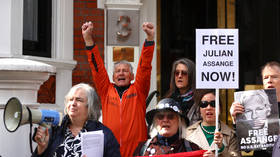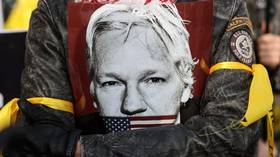Assange secures big win in US extradition hearing: How it happened

The High Court in London has ruled that WikiLeaks co-founder Julian Assange has the right to appeal an extradition request by the US. Washington is seeking to put the Australian publisher on trial for espionage for disclosing alleged war crimes committed by the US in Iraq and Afghanistan.
What Monday’s hearing was about
The UK High Court considered Washington’s assurances that Assange would be given a fair trial if extradited to the US. The court had previously requested two sets of written guarantees from the US stating that the WikiLeaks founder would not be discriminated against due to his Australian citizenship, and would not be held in a maximum security prison or receive the death penalty.
If the court had ruled that these guarantees were adequate, Assange would likely have been extradited to the US in a matter of days.
US assurances
While the US had provided the assurances, it did so with a number of conditions. The American side promised not to immediately place Assange in a maximum security prison, but reserved the right to do so based on his conduct.
US prosecutors also stated that the WikiLeaks founder would be able to rely on the First Amendment right to free speech during the trial, but noted that its applicability would be “exclusively within the purview of the US courts.”
Public support and criticism of US guarantees
Assange’s supporters slammed Washington’s diplomatic assurances, with Amnesty International’s criminal justice expert Juli Hall calling them “inherently unreliable because the US government gives itself an out.”
The publisher’s wife, Stella Assange, had also described the US guarantees as “blatant weasel words.”
Ahead of Monday’s ruling, hundreds of demonstrators gathered outside the High Court in London calling for Assange’s immediate release.
Assange’s defense
During the hearing, Assange’s lawyer Edward Fitzgerald told the judges that the assurances of a fair trial given by US prosecutors could not be relied upon as American courts would not be bound by them.
“We say this is a blatantly inadequate assurance,” Fitzgerald told the court.
The verdict
In a short ruling, the two senior judges of London’s High Court stated that the assurances provided by the US were not sufficient, and gave Assange’s legal team the right to a full appeal hearing.
While the legal battle continues, Assange himself will remain in London’s top-security Belmarsh Prison, where he has been held for the past five years since his arrest in 2019 when his asylum in the Ecuadorian Embassy in London was revoked.
Response to the ruling
The legal victory was immediately celebrated by Assange’s supporters, with Amnesty International’s Simon Crowther calling it a “rare piece of positive news for Julian Assange and all defenders of press freedom.”
“We spent a long time hearing the United States putting lipstick on a pig but the judges did not buy it” - @Stella_Assange reacting to the breaking news of the courts granting #JulianAssange the right to appeal his extraditionLivestream: https://t.co/tOe9QXtAdCDonate here:… pic.twitter.com/lc0siJjYyS
— Free Assange - #FreeAssange (@FreeAssangeNews) May 20, 2024
Stella Assange applauded the court’s verdict, claiming it had made the “right decision.” She criticized the US for the ongoing persecution of her husband, and demanded that Washington “read the situation” and drop the case against him.
Former Labor Party leader Jeremy Corbyn also celebrated Monday’s verdict, but stressed that there was still a lot to be done to secure Assange’s freedom.















